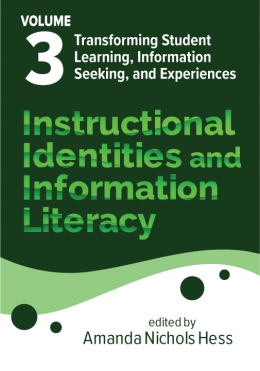
Primary tabs
You don't need to be an ALA Member to purchase from the ALA Store, but you'll be asked to create an online account/profile during checkout to proceed. This Web Account is for both Members and non-Members. Note that your ALA Member discount will be applied at the final step of the checkout process.
If you are Tax-Exempt, please verify that your account is currently set up as exempt before placing your order, as our new fulfillment center will need current documentation. Learn how to verify here.
- Description
- Table of Contents
- About the author
Are librarians teachers? Many academic librarians enter teaching roles with limited experience or education in instruction, discovering how to engage students in learning from their own observations, trial-and-error, or professional learning opportunities.
Grappling with this potentially unexpected identity comes amid a time of significant transition for higher education itself. Academic librarians must figure out how to counter mis-, dis-, and malinformation, address shrinking funding for collections while costs increase, and establish meaningful partnerships in diverse, data-driven environments. And writ large, librarianship as a profession continues to grapple with its responsibility to challenge information illiteracy across contexts, its support of systemic systems of oppression under the guise of neutrality, and its value to a society flooded with information.
In three volumes, Instructional Identities and Information Literacy uses transformative learning theory—a way of understanding adult learning and ourselves—to explore the ways librarians can meaningfully advance how we think about our identities, instructional work, and learning as transformation. Three volumes explore:
- Transforming Ourselves
- Transforming Our Programs, Institutions, and Profession
- Transforming Student Learning, Information Seeking, and Experiences
Chapters include transforming a critical, feminist pedagogy with antiracist pedagogy; becoming an advocate for library instruction to promote student success; the intersection of reluctant professionals and the academy; transforming STEM learning and information-seeking experiences; using the Framework to reshape student responses to media narratives; and much more. Instructional Identities and Information Literacy contains many ways to consider the programming, dispositions, behaviors, and attitudes we can use as we continue to advance information literacy instruction and reshape our profession.
Preface
Amanda Nichols Hess
Part I: Professional Dispositions and Preparatory Work
Chapter 1. Countering Denialism: Librarians as Advocates for Bias-Reducing Information Institutions
Mandi Goodsett
Chapter 2. Using Parts of Reflective Teaching to Create a Space for Learning
Diane Anderson
Chapter 3. From Committee to Classroom: Growing Your Instructional Identity together with Colleagues and through Class Instruction
Holly Jackson
Chapter 4. Transforming Student Learning and Consultation Experiences through a Servant Leadership Lens
Rachel E. Cannady
Part II: Pre-college and First-year Experience
Chapter 5. Developing Virtual Information Literacy Skills during the COVID-19 Pandemic: Partnership Development with the Estacado Early College High School and the TTU College of Education
Amy Dye-Reeves
Chapter 6. Information Literacy as First-Year Experience: A Case Study
Jennifer Joe
Chapter 7. Advancing the Librarian-Writing Classroom Relationship
Derek Malone and Robert Koch
Chapter 8. The Messy Sense-Making World of First-Years
Kimberly Mullins
Part III: Discipline-grounded Learning Experiences
Chapter 9. Confronting the Challenges of Teaching Hard History Through a Role-Playing Assignment
Iris Finkel
Chapter 10. The Enduring Value of Tertiary Sources in Information Literacy Instruction in the Humanities
Claudia Peterson
Chapter 11. Finding the Win: Transforming STEM Learning and Information-Seeking Experiences
Kate Mercer and Kari D. Weaver
Chapter 12. Just-in-Time Learning in a Tumultuous Time: An Asynchronous, Virtual Lab Course Model using the Framework to Reshape Student Responses to Media Narratives
Jonathan Harwell and Deborah Prosser
Chapter 13. Purple Bricks of Library Instruction: An Academic Success Program and Libraries Collaborate to Integrate Active-Learning into Library Pedagogy
Joshua Salmans and James Durham
Bibliography
Author Biographies
Amanda Nichols Hess
Amanda Nichols Hess is the e-learning, instructional technology, and education librarian at Oakland University in Rochester, Michigan. She holds a PhD in educational leadership, an Education Specialist certificate in instructional technology, and an MS in information. Her research focuses on information literacy, instructional design, online learning, and the intersections of these topics, particularly in library-centric professional learning. Her work has been published in College and Research Libraries, Communications in Information Literacy, Journal of Academic Librarianship, and portal: Libraries and the Academy, among other venues. Amanda also authored Transforming Academic Library Instruction: Changing Practices to Reflect Changed Perspectives (Rowman and Littlefield, 2019).


